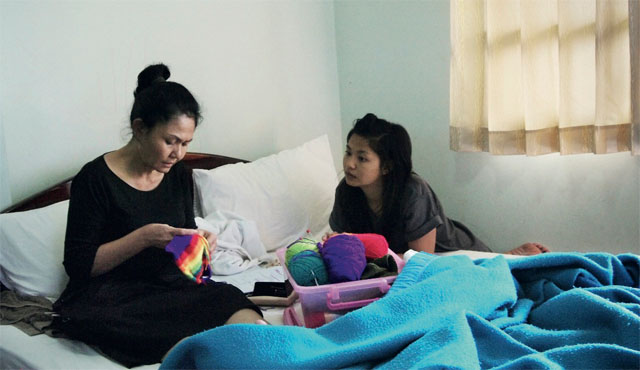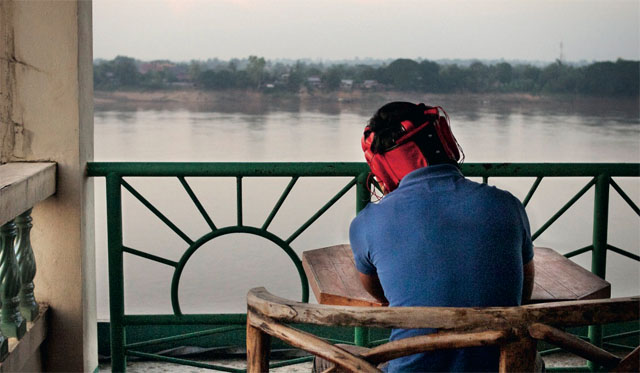Mekong Hotel is either a “sketch for the larger Mekong Project,” as Robert Koehler tells us at Film Journey, or a “59-minute offshoot of a shelved film project,” as Maggie Lee refers to it in Variety, and/or it “was commissioned for the ARTE France programming strand La Lucerne,” as Fionnuala Halligan notes in Screen. It is, of course, all three. Maggie Lee informs us that its “source is Ecstasy Garden, a stalled feature with supernatural elements developed by [Apichatpong] Weerasethakul in 2002, and inspired by the life experiences and tales of leading thesp Jenjira Pongpas, who also appeared in [Uncle Boonmee Who Can Recall His Past Lives].” Speaking of whom. She’s the inspiration for a ruminative essay by Richard Lowell MacDonald in the new issue of Criticine, which also features “a record of a conversation between Apichatpong Weerasethakul and the participants of the workshop conducted by May Adadol Ingawanij and David Teh at Khon Kaen University in the northeast region of Isaan, where the filmmaker had studied, on August 15, 2010.”
Back to Maggie Lee: “Hotel is a reworking of select rehearsal scenes [from Ecstasy Garden], offscreen documentary footage and other fictional elements.” But we also learn from the press kit that Apichatpong “is currently working on a project focussing on the Mekong River at the Thai-Laotian border,” of which this may well be a part. By the way, he’ll also be making “a major installation for the 2012 Kassel Documenta. His most recent projects include online films for MUBI (Ashes, 2012) and the Walker Art Center in the USA (Three Wonders of the World, 2012).” In MUBI’s Notebook, Daniel Kasman writes that “the film takes slivers of ideas of high fiction, documentary, actuality and the regional-historic and not so much pares those ideas down as creates with the most limited means suggestions of that which could be and now, paradoxically, is, at a slant…. It is a small film of disparate parts in flux but held in a fragile, wispy unity.”
Wherever we file it, according to Maggie Lee, Mekong Hotel “plays like a bonus track” to Uncle Boonmee, which sounds lovely. As James Quandt wrote in the March 2011 issue of Artforum, Uncle Boonmee “serves as precis for Apichatpong initiates and as primer for his novices. The former will recognize his favorite actors and tropes, his motifs of illness and unwanted solitude, his seamless, spectral shifting between the actual and the otherworldly. Neophytes, drawn perhaps by the film’s surprise win of the Palme d’Or [in 2010] at Cannes, may be confounded by the work’s narrative detours and abrupt alterations of tone, and by the ordinariness of the extraordinary: a soul migrating from a water buffalo that escapes its tether (in the pre-credit sequence) into the body of a dying man and thence, possibly, into a pebble-faced princess, whose story suddenly hijacks the otherwise relatively linear narrative; or a long-lost son returning home as a furred ‘monkey ghost,’ his eyes glowing ember-red in his Wookiee-like head. (‘Why did you grow your hair so long?’ his aunt inquires of his hirsute self.) So serene and unblinking is Apichatpong’s treatment of the supernatural that the viewer may identify with the nonplussed Laotian worker Jaai, who declares early in the film, ‘I feel like the strange one here.'”
Back to Mekong Hotel and to Robert Koehler: “Ghosts are real in Apichatpong’s cinema, and they take on extremely carnal, almost Grand Guignol effect: At times, they munch on raw meat (it looks a bit like ground steak tartar), but the mood is never close to horror. Rather, Mekong Hotel is pitched more to the tone of a reverie, made even lilting by an element which Apichatpong has never deployed before: Constant music on the soundtrack, written and performed by classical guitarist Chai Bhatana, who describes on-screen to the director that it’s something like ‘Spanish blues.’ It’s perhaps the right kind of music to listen to in order to salve the pain of the recent terrible floods in Thailand, which effectively shut down the country during the end of last year. The scars of the flood haunt the film.”
“And spirits from the past—some matter-of-factly corporeal, some scarily supernatural, some of them nagging remnants of individual memory—are an inescapable aspect of the present.” Neil Young in the Hollywood Reporter: “Here they weave in and out of a film which the director himself fancifully terms a ‘documentary portrait,’ and which features several of his previous actors apparently ‘playing’ versions of themselves…. It’s always encouraging to know that an excitingly original, genuinely artistic exponent of cinema—which Weerasethakul undoubtedly now is—is working through new sets of ideas, of course. But such experimentation is sometimes best conducted away from public view, and the self-indulgently self-referential Mekong Hotel, which feels essentially like an elaborate sketch for an upcoming feature (or three two), and on which Weerasethakul took on most of the major creative duties himself rather than trusting them to collaborators, is a case in point.”
“Even when charting deceptively familiar territory, Weerasethakul keeps finding startling new dark corners of his characters’ collective unconsciousness to explore,” writes Simon Abrams at Press Play. “Weerasethakul’s characters all dream of an eeriely mundane existence where the supernatural and the super-sexual collide…. Phon and Masato, two young lovers, meet and bond after Masato’s dog is devoured by a entrails-gobbling Pob ghost. That ghost happens to be Phon’s mother, who lives with her in a hotel room near the Mekong River. Over time, a series of elliptically represented events show us that the barrier separating the living from the dead doesn’t exist (or at least, it’s not located near the Mekong River)…. Mekong Hotel is simultaneously breezy and dense, giving it an incantatory strength.”
“No mind-altering fever dream on the level of Uncle Boonmee, the doodles for ideas in Mekong Hotel still show that, even unfinished, Weerasethakul’s world is worth a return visit,” writes indieWIRE‘s Eric Kohn. For the Guardian‘s Peter Bradshaw, though, it’s a “diverting footnote to the main body of work, no more than that.” More from Fernando Ganzo in Lumière (in Spanish).
Updates, 5/20: Michal Oleszczyk for Hammer to Nail: “Both the director and his characters keep reflecting on different layers of past and present, and the way Joe’s camera moves from room to room and terrace to terrace of the Mekong Hotel made me think of yet another non-narrative masterpiece of casual observation and underlying sadness, namely Andy Warhol’s 1966 mammoth Chelsea Girls. Weerasethakul, too, is interested in performance and addicted to capturing fleeting moments of faintly simmering desire. His latest plays like a cinematic lullaby that you keep hearing even after you fall asleep.”
“[G]enerally speaking, I’m a fan of ‘Joe’s’ beguiling blend of naturalism and animism,” writes Mike D’Angelo at the AV Club. “But the hour-long Mekong Hotel, conspicuously filed under Special Screenings rather than Competition or even Un Certain Regard, barely even qualifies as a doodle.”
Falling somewhere in between these two would be Jordan Cronk, writing for PopMatters: “Mekong Hotel offers a rare chance to witness Apichatpong work out his artistic process on camera, blurring the lines between gestating script, various stages of rehearsal, and even a finished, full-length picture. That it’s got something tangible to say about it’s director as well as our fleeting/recurring existences feels like a small, personal gift from the man himself.”
Meantime, MUBI formally presents Apichatpong’s new short, Ashes, director’s statement and all.
Update, 5/21: Dennis Lim introduces an interview for the New York Times: “Mekong Hotel only adds to the growing sense that in Mr. Apichatpong’s work, everything belongs to a larger whole: actors and motifs are transmigrated from one film to another, and each story seems to have its own past and afterlife. As in much of his recent work, the spiritual is political: while Thailand endures a cycle of political turmoil and violence, the supernatural phenomena in his films have merged with historical phantoms, the manifestations of national traumas yet to be exorcised.”
Update, 5/26: Apichatpong talks to the Hollywood Reporter.
Update, 6/5: MUBI’s Daniel Kasman interviews Apichatpong.
Cannes 2012 Index: a guide to the coverage of the coverage. For news and tips throughout the day every day, follow @KeyframeDaily on Twitter and/or the RSS feed. Get Keyframe Daily in your inbox by signing in at fandor.com/daily.






